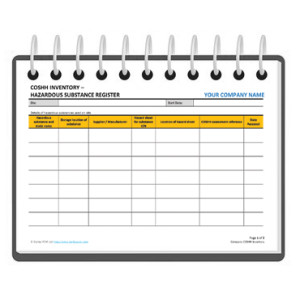Best practices for ensuring chemical safety in the workplace go far beyond simply storing the chemicals in an appropriate chemical storage unit and handling them correctly. Keeping up-to-date, accurate chemical storage records is also a core element of ensuring total chemical safety on site. Keeping chemical storage records is necessary not only to meet regulatory compliance but also to ensure employee safety and efficient inventory management. Chemical safety records also come into play when dealing with emergency response teams and insurance cases.
Regulatory Compliance
Under COSHH legislation, a business is legally required to keep records of all of the chemicals stored in the workplace – both indoors and outdoors. If your business is subject to a COSHH audit, the inspector is likely to ask to see your chemical storage records. Therefore, it is important to ensure that you maintain complete, up to date records of the chemicals stored on site in order to pass government compliance audits.
Inventory Management
Chemical storage records are necessary to ensure effective chemical inventory management. An over stock of chemicals can present a chemical hazard as well as unnecessarily driving up costs and occupying additional space on the business premises. To ensure chemical safety, it is important to try to store only the minimal level of chemicals required on site. Keeping efficient chemical stock records will also help to ensure more effective stock rotation. You can easily refer to your records to help you to ensure that you use up oldest stocks first and therefore avoid the hazards presented by chemical deterioration.
Employee Safety
Keeping chemical storage records helps to prevent employees from inadvertently causing a chemical hazard by storing incompatible hazards together. Storing incompatible chemicals together may result in generation of heat, fumes, gases and vapours that can give rise to a fire or explosion. The requirement to keep up-to-date chemical storage records can help to influence safety attitudes among employees and build a better understanding around chemical safety compliance.
Emergency Response
In the event of a fire or flood at the premises, emergency services may be reluctant to enter a building to deal with the situation because of doubt over what chemicals are stored on site and how safely they are stored. By keeping accurate and up-to-date chemical storage records, your team should be well aware of the level and types of chemical stored on site and should be able to pass such relevant information onto an emergency response team.
Insurance Purposes
Insufficient or incomplete chemical storage records could delay discovering the source of an incident in the workplace at the centre of an insurance claim such as a fire or an explosion. Chemical storage records are necessary to rule out improper storage as a reason behind a chemical incident. Neglecting to keep up-to-date chemical storage records will invalidate most insurance policies, which can result in hefty fines. Comprehensive records of safe chemical storage practices can be critical in refuting any health allegations due to chemical exposure from employees.
It is extremely important to keep comprehensive records when storing hazardous chemicals on your facility. Not doing so can put yourself and your employees in danger and leave you exposed to a host of costly fines. By understanding the reasons outlined above you can ensure you are protected from violating any regulations. If you have any more questions on hazardous chemical health and safety regulations, contact a member of our expert team or read some of our previous posts.
